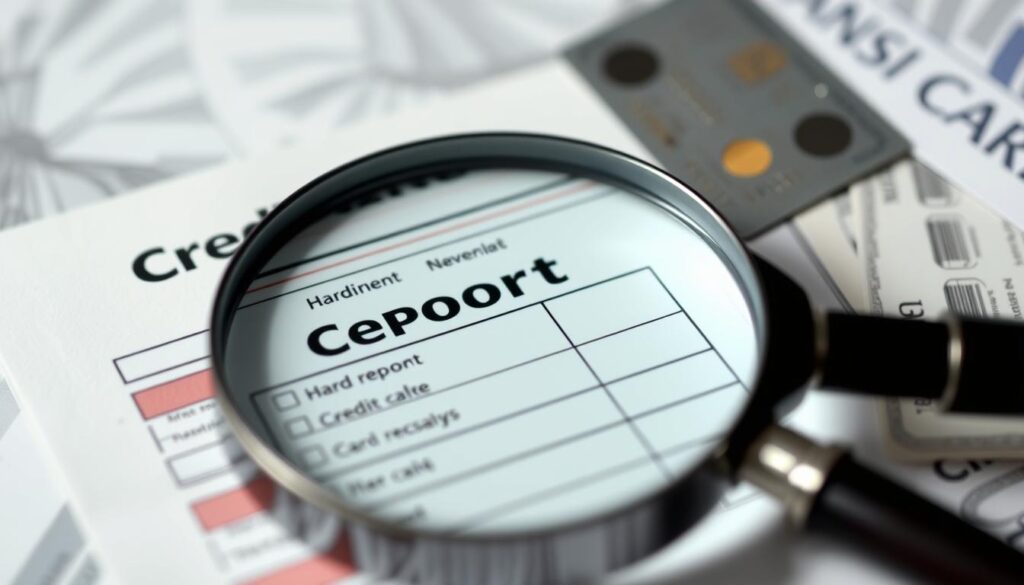A healthy credit profile is vital for financial stability. Hard inquiries can hurt your credit score, making it tough to get loans or rentals. This guide will help you identify, dispute, and remove hard inquiries from your credit report.
You’ll learn strategies to regain control of your financial future. We’ll explore how to protect your credit and understand your legal rights. By the end, you’ll know when to seek professional help for credit repair.
Key Takeaways
- Understand the difference between hard and soft credit inquiries and their impact on your credit score.
- Identify unauthorized hard inquiries on your credit report and take steps to dispute them.
- Discover the importance of maintaining good credit habits to prevent future hard inquiries.
- Learn about your legal rights and consumer protection laws when dealing with credit reporting agencies.
- Explore when to seek professional assistance, such as credit repair services, to remove hard inquiries.
Understanding Hard Credit Inquiries
Lenders review your credit report when you apply for credit. This process creates a credit inquiry. There are two types: hard and soft inquiries. Knowing the difference is key for disputing hard inquiries on credit reports.
It’s also crucial for getting rid of hard pulls on your credit history. Let’s explore these concepts further to help you manage your credit effectively.
Types of Credit Inquiries
A hard inquiry happens when a lender checks your credit for a new account. This can affect your credit score negatively. It shows you’re seeking new credit.
Soft inquiries occur for pre-approvals or background checks. These don’t impact your credit score. Employers or lenders use them for purposes other than new credit applications.
Impact on Credit Scores
A single hard inquiry may not significantly affect your score. However, multiple inquiries in a short time can cause a bigger drop. This suggests you might be a higher-risk borrower.
Credit scoring models often ignore multiple inquiries for the same credit type. This applies within a 14-45 day period. It’s seen as rate shopping, not risky behavior.
| Type of Inquiry | Impact on Credit Score |
|---|---|
| Hard Inquiry | Potential negative impact, typically a 5-10 point drop |
| Soft Inquiry | No impact on credit score |
Knowing how hard and soft inquiries affect your score is vital. It helps in disputing hard inquiries on credit reports. You can also work on getting rid of hard pulls on your credit history.
Address unauthorized or inaccurate hard inquiries promptly. This will help maintain a healthy credit profile. It can also improve your overall creditworthiness.
Reasons for Hard Inquiries on Your Credit Report
Hard inquiries on your credit report can impact your credit score. It’s important to know why they happen. This knowledge helps you spot and fix any unauthorized or wrong entries.
Applying for new credit is a common reason for hard inquiries. This includes credit cards, loans, or mortgages. Lenders check your credit to decide if you qualify.
- Applying for a credit card or loan
- Securing a mortgage or refinancing an existing one
- Leasing a vehicle or signing up for a cell phone contract
Hard inquiries can also come from erroneous credit report inquiries. These might be due to mistakes or identity theft. It’s vital to spot and challenge these unauthorized checks.
Inaccurate hard credit checks by creditors can happen too. These might be from clerical errors or other mix-ups. Fixing these helps keep your credit report accurate.
“Removing unauthorized hard inquiries from your credit report can be a complex process, but it’s an important step in maintaining a healthy credit profile.”
Understanding hard inquiries helps you protect your credit score. You can spot issues and take steps to fix them. This keeps your credit history accurate and healthy.

Identifying Unauthorized Hard Inquiries
Keeping tabs on your credit report is vital. It helps you spot any unauthorized hard inquiries made without your consent. These illicit inquiries can hurt your credit score.
It’s crucial to address them quickly. Promptly tackling these issues can protect your financial health.
Reviewing Your Credit Report
Start by checking your credit report from all three major bureaus. These are Experian, Equifax, and TransUnion.
Look closely at the “Hard Inquiries” section. Make sure all listed inquiries are ones you’ve approved.
- Look for any unfamiliar or suspicious hard inquiries that you don’t recognize.
- Check the dates and creditors associated with each hard inquiry to verify their legitimacy.
- Be vigilant in detecting any improper credit report hard pulls that may have slipped through.
Spotting Errors and Inaccuracies
Scrutinize your credit report for other errors too. Inaccurate information can harm your credit score and overall financial health.
- Carefully review all personal information, account details, and payment history listed on your credit report.
- Identify any discrepancies or mistakes, such as incorrectly reported late payments or closed accounts still appearing as open.
- Take note of any removing illicit hard credit inquiries or clearing improper credit report hard pulls that need to be addressed.
Regular credit report reviews are key. They help you uncover unauthorized hard inquiries and other inaccuracies.
Addressing these issues promptly can lead to a healthier credit profile. Stay vigilant to maintain your financial wellbeing.
How to Remove Hard Inquiry From Credit Report
Unwanted hard inquiries on your credit report can be frustrating. Identify unauthorized or inaccurate inquiries first. Then, start a dispute with the credit bureaus.
Disputing with Credit Bureaus
Contact credit bureaus directly to dispute a hard inquiry. Each bureau has its own dispute process. Follow their guidelines carefully.
You’ll need to submit a written dispute letter. Include supporting documents that prove the inquiry is invalid or inaccurate.
Providing Supporting Documentation
Evidence is crucial when disputing a hard inquiry. Gather copies of loan applications, credit card statements, or other relevant documents.
These documents should show the inquiry wasn’t authorized or was made in error. Expunging wrongful hard inquiry records can be complex, so be thorough.
Credit bureaus must investigate your dispute by law. They should respond within a reasonable time. If the inquiry is inaccurate, they must remove it.

“The key to successfully removing a hard inquiry is to provide the credit bureaus with clear and compelling evidence that the inquiry was made in error or without your authorization.”
Dealing with Creditors and Lenders
Removing unauthorized credit report inquiries often involves working directly with creditors and lenders. These entities initiate hard inquiries that can negatively impact your credit score. Addressing the issue with them can lead to quicker problem resolution.
Start by carefully reviewing your credit report for suspicious inquiries. Identify the specific creditors or lenders involved. Then, reach out to them directly by phone or in writing.
Explain the situation calmly and professionally. Ask them to investigate the unauthorized inquiry and provide supporting documentation. If it’s a mistake, request its removal from your credit report.
- Politely request that they investigate the unauthorized inquiry and provide you with documentation to support their findings.
- If the inquiry is deemed to be a mistake or unauthorized, firmly request that they remove it from your credit report.
- Be prepared to provide any supporting evidence or documentation you may have to back up your claim.
Creditors and lenders want accurate credit reports to avoid financial losses. A cooperative approach increases your chances of a favorable outcome. Keep track of your conversations and any agreements made.
| Creditor or Lender | Contact Information | Status of Inquiry Resolution |
|---|---|---|
| ABC Bank | 1-800-555-1234 | Pending |
| XYZ Credit Union | 1-555-123-4567 | Resolved |
| Acme Mortgage | 1-987-654-3210 | Pending |
Taking a proactive approach with creditors can help remove unauthorized credit report inquiries. This strategy safeguards your credit profile and maintains your financial health.
Strategies for Preventing Hard Inquiries
Protecting your credit report requires proactive measures to prevent hard inquiries. Rate shopping and obtaining preapprovals are two effective strategies. These methods can help you maintain a healthy credit profile.
Rate Shopping
Rate shopping involves comparing offers from multiple lenders. This approach helps you find the best rates and terms for loans or credit products. It also helps avoid multiple hard inquiries on your credit report.
You can submit a single application to multiple lenders. This often allows you to get pre-qualified without triggering a hard inquiry for each application. It’s a smart way to protect your credit score.
- Research and compare rates and terms from various lenders
- Submit a single application that allows lenders to check your creditworthiness
- Avoid applying for credit with multiple lenders separately, as each application can result in a hard inquiry
Preapprovals
Obtaining preapprovals is another effective strategy to prevent hard inquiries. Lenders review your credit profile and financial information for preapproval. They determine the maximum amount they’re willing to lend without a full application.
- Contact lenders and request a preapproval
- Provide the necessary financial information, such as income, employment, and existing debts
- Once preapproved, you can shop for specific loan products or credit cards without triggering additional hard inquiries
These strategies help minimize hard inquiries on your credit report. They’re crucial for maintaining a strong credit profile. This approach is key to how to remove hard inquiry from credit report.

The Impact of Removing Hard Inquiries
Hard inquiries can hurt your credit score. They make it harder to get good loans or credit cards. Removing hard inquiries from your credit report can boost your score and improve credit access.
Deleting hard inquiries from your credit report can raise your credit score. Hard inquiries can lower your score by a few points. Removing them often leads to a noticeable improvement in your score.
A higher credit score opens up new financial opportunities. You may qualify for better interest rates on loans and credit cards. This can lead to significant savings over time.
| Metric | Before Removal | After Removal |
|---|---|---|
| Credit Score | 720 | 730 |
| Interest Rate on Auto Loan | 5.5% | 4.8% |
| Monthly Payment on $25,000 Auto Loan | $472 | $450 |
The table shows how removing hard inquiries from your credit report can help. A 10-point credit score increase can lower your auto loan interest rate. This results in a $22 decrease in monthly payments on a $25,000 loan.
Removing hard inquiries from your credit report can have wide-reaching benefits. It can improve your credit score and financial flexibility. Addressing unauthorized or inaccurate hard inquiries should be a top priority for maintaining good credit.
Legal Rights and Consumer Protection Laws
Understanding your legal rights is key when removing hard inquiries from your credit report. These laws ensure fair practices in credit reporting. They can be crucial in your efforts to remove hard inquiry from credit report.
The Fair Credit Reporting Act (FCRA) governs credit information handling. It gives you the right to dispute inaccurate data on your report. This includes unauthorized hard inquiries. Credit bureaus must respond to disputes promptly.
The FCRA requires credit bureaus to provide a free annual credit report. This allows you to review your credit history regularly. It also limits the types of negative information that can be reported.
- The FCRA also requires credit bureaus to provide you with a free copy of your credit report annually, allowing you to regularly review and monitor your credit history.
- Additionally, the FCRA imposes strict limitations on the types of information that can be included in your credit report, such as restricting the reporting of outdated or irrelevant negative items.
The Consumer Financial Protection Bureau (CFPB) enforces credit reporting protection laws. It can investigate and act against unfair practices by credit bureaus or lenders.
“Consumers have the right to dispute any inaccurate or incomplete information on their credit reports, and credit bureaus are required by law to investigate and respond to these disputes.”
Knowing these laws empowers you to remove hard inquiry from credit report. It helps you navigate the process confidently. You can ensure your rights are upheld when resolving disputed hard inquiries.

Maintaining Good Credit Habits
Developing good credit habits is crucial for a healthy credit profile. These practices help maintain your credit and prevent future hard inquiries from hurting your score. Let’s explore strategies to keep your credit in top shape.
Regularly monitor your credit report. Review it at least once a year to ensure accuracy. This helps you spot any new unauthorized hard inquiries early on.
Manage your credit utilization responsibly. Keep credit card balances below 30% of your limit. This shows lenders you’re a responsible borrower who uses credit wisely.
- Make on-time payments: Paying bills on time is crucial for building a strong credit history.
- Limit new credit applications: Avoid multiple new credit accounts in a short time to reduce hard inquiries.
- Diversify your credit mix: Having various types of credit can positively impact your credit score.
By following these habits, you can protect your credit score. Your hard inquiry removal efforts will have a lasting impact. Remember, credit building is an ongoing process.
With careful financial management, you can achieve your credit goals. Stay diligent and focused on maintaining good habits.
“Credit building is a marathon, not a sprint. Developing and sticking to good credit habits will serve you well in the long run.”
When to Seek Professional Assistance
Removing hard inquiries from your credit report can be challenging. Credit repair services can help with inaccuracies, errors, or unauthorized inquiries. These experts can guide you through the complex process.
Credit Repair Services
Credit repair services offer valuable help for those struggling with hard inquiries. They have experts who understand credit reporting and can assist in disputing erroneous inquiries.
These services review your credit report thoroughly. They draft and submit disputes to credit bureaus. They also monitor progress and follow up on inquiry removals.
Additionally, they provide guidance on improving your overall credit profile.
- Detailed review of your credit report to identify potential issues
- Assistance in drafting and submitting disputes to the credit bureaus
- Ongoing monitoring and follow-up to ensure the hard inquiries are properly removed
- Guidance on credit-building strategies to improve your overall credit profile
Research credit repair services carefully before hiring. Look for reputable companies with proven success. Ensure they comply with consumer protection laws.
| Credit Repair Service | Avg. Cost | Success Rate | Customer Satisfaction |
|---|---|---|---|
| Credit Karma | $0 – $99/month | 78% | 4.7/5 |
| Lexington Law | $99.95 – $129.95/month | 83% | 4.3/5 |
| Sky Blue Credit | $79 – $99/month | 72% | 4.6/5 |
Try resolving credit report issues on your own first. This approach is often more cost-effective. However, professional help may be necessary if you’re struggling.
Timelines and Follow-Up Actions
Removing hard inquiries from your credit report takes time. Credit bureaus typically have 30 days to investigate disputes. This timeline may vary based on case complexity.
Follow up regularly to track your dispute’s progress. Check your credit report often to confirm disputed inquiries are removed. Stay proactive to improve your chances of success.
Keep monitoring your credit report after inquiries are removed. This helps catch new unauthorized inquiries and other potential errors. Staying vigilant protects your credit profile.
Key Timelines to Keep in Mind
- Credit bureaus have 30 days to investigate and respond to a dispute
- The process may take longer depending on the complexity of the case
- Follow up regularly to track the progress of your dispute
- Continue monitoring your credit report even after the hard inquiries have been removed
Importance of Follow-Up Actions
- Ensures the successful resolution of disputed hard inquiries
- Helps you catch any new unauthorized inquiries that may appear on your credit report
- Allows you to identify and address any other potential errors or inaccuracies in your credit file
Understanding timelines and following up consistently improves your chances of success. This approach helps maintain a healthy credit profile. Removing hard inquiries from your credit report becomes more effective with these strategies.
| Timeline | Action |
|---|---|
| 30 days | Credit bureaus investigate and respond to disputes |
| Ongoing | Monitor your credit report for any new unauthorized inquiries |
| Continuous | Follow up regularly to track the progress of your dispute |
Avoiding Credit Repair Scams
Be cautious when removing hard inquiries from your credit report. Credit repair scams can harm your finances. Stay informed and alert to protect yourself.
Scammers often promise unrealistic results, like removing valid inquiries quickly. Honest credit repair companies are clear about timelines and possible outcomes. Avoid providers making big claims or pushing for immediate sign-ups.
Watch out for demands for large upfront fees. Legitimate services must provide detailed contracts outlining their work and charges. They can’t ask for payment before completing tasks.
Be wary of companies requesting substantial sums before starting. This is a clear warning sign of a potential scam.

